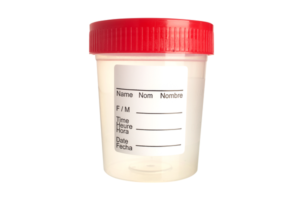Life Insurance: Urine Test
FREE Life Insurance Comparison
Secured with SHA-256 Encryption
Compare quotes from the top life insurance companies and save!
You may be wondering, “what do life insurance urine tests look for?” Anyone who wants to buy a standard life insurance policy will be asked to take certain medical tests before the policy will be issued. The use of medical tests that examine substances present in blood, urine and saliva are nothing new.
With advances in medical technologies and the declining cost of testing, it is now possible for insurance underwriters to order tests for virtually all standard term and permanent life insurance plans.
Each test has its own purpose and can paint a vivid picture of your lifestyle to the insurance company. Read on, and familiarize yourself with the underwriting process so that you can learn more about the life insurance urine test.
And be sure to use the FREE comparison tool above to start your quote search instantly.
Life Insurance and Risk
When you buy any type of insurance policy, the company will use statistics and claims records to assess risk. Your premiums will ultimately be based on how much risk you present to the company.
Policyholders who are more likely to file a claim will pay higher premiums, even if they never do end up filing that claim that the company projects. Policyholders who are less risky pay less premiums and may end up filing claims that could not be predicted.

In the marketplace, the projections counterbalance each other and the money in the pool from risky and less risky policyholders will be used for claims payouts.
Money is invested, and the income on those investments will pay for operational costs as well as claims. This is how an insurer will stay profitable.
In the life insurance marketplace, insurers must do more personal assessments than they would do for other lines of insurance.
This is because not everyone will get into a car accident, experience a theft, or have a home burn down, but everyone will eventually die.
It is the insurer’s job to project when a particular person will die as close to the date as possible so that they can collect enough premiums to profit if they are on the line to pay for a death benefit claim.
The process of assessing risk and projecting when an applicant will die is referred to as underwriting.
What happens during the underwriting process?
When you request a quote for life insurance, you will answer a specific set of questions. Most insurance agents or quoting forms will ask you your age, your height, your weight, your gender, zip code, whether or not you smoke, and if you have any common medical conditions.
You are asked these standard questions in order to put you in a category on the mortality table and to assign you to a rating class. The rating class that you are assigned to will be what ultimately affects your rates.
The rating class that you are quoted in may not be the rating class that you end up in. In order to verify that you are in that rating class, the application that you submit will be underwritten using specific tools, medical tests, and other sources.
During the underwriting process, the professional who reviews the application will order tests, review your medical records, and check databases like the Medical Information Bureau that all life insurers report to.
The purpose of this is to verify that you are in good health, you are eligible for coverage, and that your lifestyle and habits do not make you too unpredictable to insure.
What do life insurance underwriting medical tests look for?
Not all life insurance companies use the same medical tests to underwrite policies. The tests that are ordered will depend entirely on your age, the type of policy that you apply for, and the amount of coverage that you need.
Generally, if you are in a younger age bracket, you will only need to submit to the basic tests.
If you are in a higher age bracket, you have specific medical conditions that could or could not present risk, or you want a large amount of coverage, you will need to take more tests beyond just a urinalysis and blood test.
What is a urinalysis and what can it show the insurer?

The urinalysis is perhaps the most popular test that is required by life insurers and even by employers.
It is the most popular test due to the fact that it is both affordable and can teach the underwriter more about their subject and help them determine risk profiles.
If you are not buying a policy with a large face value, the urinalysis may be the only test you need to prove that everything stated on your application is true.
There may be times where more rigorous screening is necessary, even if you do not want a large policy.
A urinalysis is a test that uses your urine sample to detect both illegal and legal substances in the system.
The test is primarily used to detect whether or not the applicant has abused any substances in the past few days or weeks.
While it is effective in detecting substance abuse in a small window of time, it cannot detect substance abuse that was more than a month prior.
Only blood tests or hair follicle exams are able to look for the use of illegal substances in the past 6 to 9 months, but these tests are more expensive and not commonly ordered unless something must be verified that cannot be verified by the less expensive options.
A urinalysis can test for more than just the use of illicit substances. It may also look for prescription drugs like painkillers. If these are found in your system and you have not disclosed that you have been prescribed the drug, you could be asked for a further explanation.
In some cases, your urine can also indicate if you have specific medical problems.
Certain results may show that the applicant has high cholesterol, kidney problems, or uncontrolled diabetes. If anything is uncovered, additional testing may be ordered.
If you are not willing to comply, you may be denied for coverage and this denial will be reported to the Medical Information Bureau database which all insurers can access.
Are there any policies that do not require you to give urine?
For some, giving urine samples or samples of other bodily fluids is too personal. If you do not want a life insurance company to poke you and look deep into your medical history, there are policies that do not require medical underwriting.
These are generally call no underwriting policies because they are lax with the questions that they ask and do not require you to give blood, saliva, or urine to prove you are drug-free and healthy.
While it may sound like much less of a hassle to apply for a term life plan that has no medical exam requirement, the convenience comes with at a price. When you do not have to prove that you are healthy and that you do not smoke or use drugs, you are a much higher risk automatically.

When you are a higher risk, you automatically pay more money. So a no underwriting policy will cost you more than a fully-underwritten one.
The policy may be issued much faster than a policy where test results must be sent, but it does not provide you with the same level of protection.
In most cases, these specialty plans also have death benefit limits so you will not be able to buy a large plan.
They may also have premiums that go up each year</a> and that are not locked in like a level term.
Another option for people who do not want their urine or blood tested is to apply for a Accidental Death and Dismemberment plan.
This is a specialized and limited form of life coverage that will provide larger benefits for a lower cost, but that will only cover the named insured if they pass away or lose a limb in an accident.
If the policyholder were to fall ill or was diagnosed with a disease, the policy would not pay. This is something that you need to make yourself aware of before you decide to skip underwriting to buy a life plan.
Why Comparison Shopping Is So Important
If you have decided that you will go through the underwriting process to get quality and expansive coverage, the best bet is to compare rates through many companies. As you are doing this, find out what the underwriting requirements are.
If you know what to expect and what the underwriters are looking for, you can prepare yourself for the process without any surprises.
There are many ways that you can compare life rates. You can visit an agent, call a call center, contact a broker, or use an online rating tool that will give you access to the rates through several companies at once.
If you want to price shop from your home, use an online rating tool, such as the FREE tool below, and you can be choosy with the life insurance company you apply to.
Start Saving on Life Insurance!
Enter your zip code below to compare rates from the top companies in your area
Secured with SHA-256 Encryption



